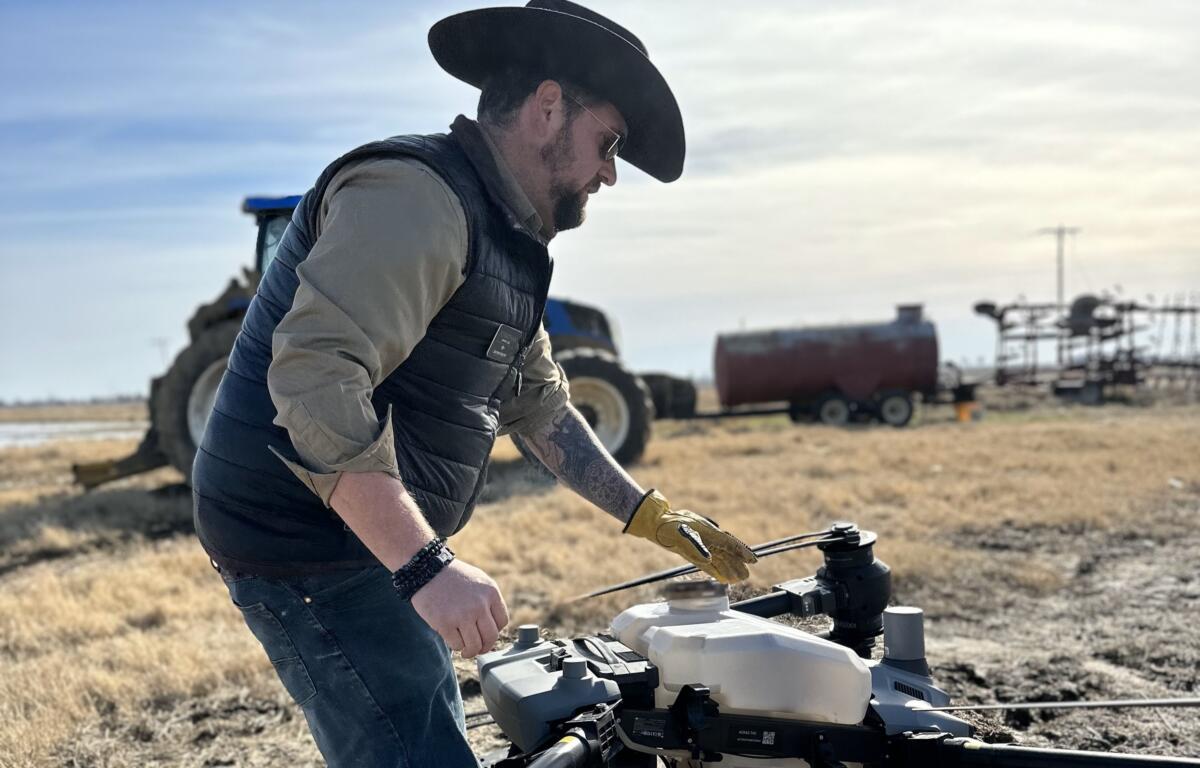Jonesboro, AR – (JonesboroRightNow.com) – April 16, 2024 – Jonathan Cottingham flipped a switch on a controller and four sets of propellers on his large drone began spinning in a field in southwest Jonesboro.
He moved a lever and the 240-pound DJI Agras T40 slowly rose, sending a wash of dust into the brisk afternoon wind. Despite the breeze, the drone, with an 11-foot wingspan, hovered still and level like a hummingbird. Cottingham moved some more levers and the T40 took off.
Cottingham was demonstrating the versatility of the drone, which he can use to apply fertilizer or pesticides quickly on farm fields.
Going high-tech is the direction of farming now and Cottingham, 41, is leading the way with his Jonesboro-based company, Southern Drone OPS.
The business, which he created in 2013, uses drones, computerized scanning of farm fields, analytical data and application mapping to help farmers. It saves time, wear on heavy farm equipment and, best of all, money.
“It’s not the future,” Cottingham said of the new farming methods. “It’s right now.”
It’s a vast change from what he grew up with. Both his father and grandfather were crop duster pilots, the daring aviators who fly low over fields, dodge telephone lines and dump chemicals on crops before zooming back up to do the next row.
“They put their heart and soul into it,” he said. “Aviation and agriculture have always been in the family. It’s in our blood.”
Cottingham’s business recently made a unique full circle. He was hired to spray a “difficult” field near Cash. Most crop dusters couldn’t handle the job because of the limited area pilots needed to apply the chemicals and then quickly raise the plane back up at the field’s end.
“It was hard to get to,” he said. “The landowner said there was one ‘wild pilot’ who could do that.” The pilot was Rodney Godley, Cottingham’s father. His father got to see his son’s business grow before he passed away last year.
Cottingham said some farmers first resisted the idea of using a drone to fertilize their fields. But once they saw how quickly it could be done – Cottingham can spray 40 acres an hour—they began favoring the idea.
His drone uses 40 percent less chemicals than a practical tractor and sprayer and uses only 10 gallons of gasoline. It takes only 45 seconds to fill the drone’s tank with chemicals once it’s emptied; the process looks like a pit crew at a NASCAR race, he said.
And the drones are safer, Cottingham added. “If this crashes,” he said, pointing to the Agras drone, “I’m mad, but I’m alive.”
Last year, four crop dusters were killed in northeast Arkansas when their planes crashed.
Applications are only one feature of Cottingham’s drones. Using cameras on a smaller drone, Cottingham can capture video of a field and assess the crop’s growth patterns and areas where pesticides and insecticides are needed. Instead of spraying an entire field, wasting chemicals on unneeded areas, Cottingham can pinpoint vital areas.
He uses a Mavic 3 drone with five camera lenses to analyze fields and then uses a computer to create a spraying “prescription.”
The technology also eliminates “farmer fatigue” and, at a time when finding farm laborers is difficult, it saves farmers labor expenses and time. The drones can be used at night, provided farmers obtain Federal Aviation Administration approval.
Cottingham is now working with the U.S. Department of Defense to apply sensors to his drone to evaluate any chemical spills, industrial accidents, terrorist attacks, and other issues. In the past, officials may have had to use helicopters to assess situations, which was costly and time-consuming.
Because of his expertise in new-tech agriculture, Cottingham will begin teaching three-hour agriculture classes at Southern University and A&M College in Baton Rouge, LA, this fall. He also is conducting his apprenticeship program in the summer where he teaches 12 to 15 youngsters farming techniques.
Students of the apprenticeship will follow the growing stage of crops and learn about using Cottingham’s technology to help harvest the crops.
“It’s real-world experience,” he said of his training.
The pace of technology is moving fast, even for Cottingham. He said he figured he’d end up trying to convince farmers to use his drones to spray their fields the rest of his life.
“I thought that’s what I’d be doing,” he said. “I didn’t plan for all these other things happening.”




